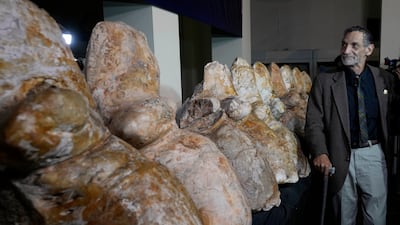A whale that lived 40 million years ago may be the heaviest creature to have ever lived, scientists have said.
Researchers found the fossils in Peru and their findings were published in the journal Nature on Wednesday.
Until now, the blue whale was widely regarded as the largest animal in history.
The ancient whale has been named Perucetus colossus, or “the colossal whale from Peru”.
Each vertebra weighs more than 100kg and its ribs measure about 1.4 metres long.
Despite being a mere 20 metres long, the skeleton is two to three times heavier than that of a 25-metre blue whale because of its density, researchers found.
“It’s just exciting to see such a giant animal that’s so different from anything we know,” AP quoted palaeontologist Hans Thewissen as saying.
Found more than a decade ago in a rock formation in Peru's southern Ica desert, a team has spent years excavating the remains from the site which is known to have once been underwater.
The fossils, which are 39 million years old, “are unlike anything I’ve ever seen", said study author Alberto Collareta, a palaeontologist at Italy's University of Pisa.
It is “the heaviest skeleton as far as mammals are concerned, possibly the heaviest vertebrate ever”, he told The Guardian.
Researchers used 3D scanners and drills to study the bones and compared the specimen to modern mammals.
Scientists compared 13 vertebrae, four ribs and a single hip bone from the specimen to those of other animals in the whale family, and say the whale most likely had forelimbs for walking on the seabed.
Researchers say Perucetus would have scavenged the sea floor for food, but without the skull, it is hard to determine exactly what it ate.
“I wouldn’t be surprised if this thing actually fed in a totally different way that we would never imagine,” Mr Thewissen said.

